
Recherche
PGE2's Sneaky Sabotage: Alleviating PGE2 impairment of TIL expansion for effective adoptive Cell Therapy
This new study, in Nature, sheds light on how a lipid overexpressed in tumors, prostaglandin E2 (PGE2), cripples the very immune cells tasked with eradicating cancer.

Scientists from Dangaj Laniti Lab and Coukos Lab, from the Department of oncology UNIL-CHUV, and the Lausanne Branch of the Ludwig Institute, have uncovered a stealthy mechanism employed by tumors to evade the body's natural defenses. Their study, published in Nature, sheds light on how a lipid overexpressed in tumors, prostaglandin E2 (PGE2), cripples the very immune cells tasked with eradicating cancer. This revelation not only deepens our understanding of cancer biology but also offers promising avenues for novel treatments.
The PGE2 Barrier:
The study* published in Nature, led by Dr. Matteo Morotti and Dr. Alizee J. Grimm uncovers the pivotal impact of PGE2 in compromising the efficacy of cancer immunotherapy such as tumor infiltrating lymphocytes (TIL)- adoptive cell therapy (ACT), a promising therapeutic strategy that leverages patients' own immune cells to combat cancer. The research revealed that PGE2 prevents the optimal expansion of tumor-reactive T cells and thus limits the efficacy of TIL-ACT therapy.
A Glitch in the Immune System:
The problem stems from a disruption in how T cells respond to interleukin-2 (IL-2), a critical molecule that promotes proliferation and antitumor activity of T cells. By analyzing clinical and translational data from patients involved in a TIL-ACT trial at CHUV in Lausanne, the researcher discovered a critical role for PGE2 in limiting the growth of tumor-reactive TIL, which are essential for a better response to TIL-ACT. Briefly, PGE2 affects IL-2 signalling in T cells, causing metabolic failure and, eventually, death in the tumor microenvironment due to oxidative stress. The blockade of this pathway was able to re-sensitize T cells to IL-2 and thus sustaining their function and leading to a better antitumor activity.
To further understand:
The researchers demonstrated that T cell suppression by PGE2 is mediated via the PGE2 receptors EP2 and EP4, identifying EP2/EP4 receptors as T cell-intrinsic immune checkpoints that can be targeted to elicit proliferative responses of tumor-infiltrating anti-cancer T cells and thereby overcoming dysfunctional anti-cancer immunity.
Mechanistically, PGE2 inhibits IL-2 sensing in TILs by downregulating the IL-2Rγc chain receptor, resulting in defective assembly of IL-2Rβ/γc receptor in T cells. This results in impaired IL-2 signalling and mTOR adaptation and PGC1a transcriptional repression to cause oxidative stress and ferroptotic cell death in tumor-reactive TILs. Importantly, they show that blockade of PGE2-EP2/4 axis during in vitro TIL expansion allows anti-tumor CD8+ T cells to engage in IL-2 driven proliferation and results in a TIL-ACT product with effective cancer immune control potential. Together, these results identify PGE2-signalling through its receptors EP2 and EP4 as a key mechanism suppressing IL-2-driven anti-cancer T cell immunity.
A Tale of Collaboration:
This study not only delivers significant scientific findings but also embodies the power of collaboration. Accompanying this study is a complementary publication led by the lab of our collaborator Dr. Jan P. Böttcher at Technical University of Munich, Germany. This publication demonstrates in multiple mouse cancer models that PGE2 targets tumor-infiltrating TCF1+ CD8+ T cells, impairing their expansion and effector differentiation within the tumor microenvironment. Of note, PGE2 does not affect the stem-like capabilities of cancer-specific CD8+ T cells located in lymphoid tissues. Therefore, key features of this immune-suppressive mechanism are fundamentally different to PD-1-mediated immune inhibition, which has recently been shown to act on T cells within lymph nodes but not tumor tissue. Consequently, this leads to the collapse of the anti-cancer T cell response.
*PGE2 inhibits TIL expansion by disrupting IL-2 signalling and mitochondrial function.
This study was supported by the Ludwig Institute for Cancer Research, Swiss Cancer League Foundation, the German research foundation and grants from the Biltema Foundation, Paul Matson Foundation and Cancera Foundation.
Dr. Denarda Dangaj Laniti leads the Tumor Microenvironment & Biomarker Discovery Group as its Group Leader in the Department of oncology at UNIL-CHUV. She is also a Privat Docent (Lecturer) at the Faculty of Biology and Medicine (FBM), University of Lausanne.
Prof. George Coukos holds the position of Full Professor at the FBM, University of Lausanne and serves as the head of the Department of oncology at UNIL-CHUV. Additionally, he fulfills the role of director at the Lausanne Branch of the Ludwig Institute for Cancer Research.


